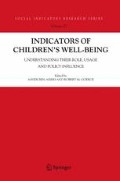Abstract
Research has shown that children are most successful as they enter schoolwhen they have developed the emotional capability to manage their feelings and behavior and when they have a base of strong academic and social skills. The research base also shows that children experience the greatest success in the early elementary years when families are involved in their children’s education, when teachers understand healthy child development, and when communities offer support that helps children and families grow and thrive.
Access this chapter
Tax calculation will be finalised at checkout
Purchases are for personal use only
Preview
Unable to display preview. Download preview PDF.
References
Brock, T., et al. (2002). Welfare Reform in Cleveland. New York: MDRC.
Brock, T., et al. (2004). Welfare Reform in Miami. New York: MDRC.
Capizzano, J. and Stagner, M. (2005). Studying the role of child well-being indicators in the policy process: using surveys among decision makers. In Ben Arieh, A. and Goerge, B. (eds.), Indicators of Children's Well-Being: Understanding Their Role, Usage, and Policy Influence. Dordrecht, Netherlands: Springer-Verlag, pp. 151–160
Cochrane Collaboration (2002). Cochrane controlled trials register. The Cochrane Library, 3rd edition. New York.
Figlio, D.N. (1995). The effects of drinking age laws and alcohol-related crashes: time series evidence from Wisconsin. Journal of Policy Analysis and Management, 14(4):555–566
Gennetian, L.A., Duncan, G., Knox, V., Clark-Kauffman, B., and Vargas, W. (2002a). How Welfare and Work Policies for Parents Affect Adolescents: A Synthesis of Research. New York: MDRC.
Gennetian, L.A., et al. (2002b). Making Child Care Choices. New York: MDRC.
Gennetian, L.A., Morris, P., Bos, J., and Bloom, H. (in press). Using instrumental variables analysis to learn more from social policy experiments. In Bloom, H. (ed.), Moving to the Next Level: Combining Experimental and Nonexperimental Methods to Advance Employment Policy Research.New York: Russell Sage.
Gomby, D.S., Culross, P.L., and Behrman, R.E. (1999). Home visiting: recent program evaluations, analysis, and recommendations. Future of Children, 9(1):4–26
Greenberg, D. and Shroder, M. (1997). The Digest of Social Experiments. Washington, DC: Urban Institute Press.
Little, T. (2005). Increasing the impact of indicators among legislative policymakers. In Ben Arieh, A. and Goerge, B. (eds.), Indicators of Children's Well-Being: Understanding Their Role, Usage, and Policy Influence. Dordrecht, Netherlands: Springer-Verlag, pp. 131–140
McCall, R.B. and Green, B.L. (2004). Beyond the methodological gold standard of behavioral research: considerations for practice and policy. Social Policy Report, 18(2), pp. 1–20
Michalopoulos, C. (in press). Precedents and prospects for randomized experiments. In Bloom, H. (ed.), Moving to the Next Level: Combining Experimental and Nonexperimental Methods to Advance Employment Policy Research.New York: Russell Sage.
Moffitt, R. (2003). The role of randomized field trials in social science research: a perspective from evaluations of reforms of social welfare programs. National Bureau of Economic Research Working Paper No. T0295.
Moore, K.A., Brown, B.V., and Scarupa, H.J. (2003). The uses (and misuses) of social indicators: implications for public policy. Research Brief. Washington, DC: Child Trends.
Morris, P., Duncan, G., and Clark-Kauffman E. (2004). Child well-being in an era of welfare-reform: the sensitivity of transitions in development to policy change. Unpublished manuscript. New York: MDRC.
Morris, P., and Gennetian, L. (2003). Identifying the effects of income on children's development using experimental data. Journal of Marriage and the Family, 65:716–729
Munnell, A.H. (1986). Lessons from the Income Maintenance Experiments: Proceedings of a Conference Held in September 1986. Boston: Federal Reserve Bank of Boston.
Office of Income Security Policy, Department of Health and Human Services (1983). Overview of the Seattle-Denver Income Maintenance Experiment Final Report. Washington, DC: U.S. Government Printing Office.
Song, Y. and Lu, H. (2002) . Child Poverty Fact Sheet. New York: National Center for Children in Poverty.
U.S. Department of Health and Human Services (2000). Trends in the Well-Being of America's Children and Youth.Washington, DC: U.S. Government Printing Office.
Author information
Authors and Affiliations
Editor information
Editors and Affiliations
Rights and permissions
Copyright information
© 2006 Springer
About this chapter
Cite this chapter
KLEIN, L.G. (2006). Using Indicators of School Readiness to Improve Public Policy for Young Children. In: Ben-Arieh, A., Goerge, R.M. (eds) Indicators of Children's Well Being. Social Indicators Research Series, vol 27. Springer, Dordrecht. https://doi.org/10.1007/1-4020-4242-6_8
Download citation
DOI: https://doi.org/10.1007/1-4020-4242-6_8
Publisher Name: Springer, Dordrecht
Print ISBN: 978-1-4020-4237-9
Online ISBN: 978-1-4020-4242-3
eBook Packages: Humanities, Social Sciences and LawSocial Sciences (R0)

